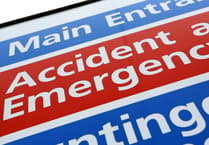Letter to the Crediton Courier:
WHEN my great grandfather was born, his father, as a working class UK citizen, did not have the right to vote.
When my grandmother was growing up, women in the UK still did not have the right to vote.
When my mum was born, women were not allowed to vote until they were 30.
That's nine years later than their brothers and husbands.
During my childhood years, black citizens of the USA were barred from voting, and when they took part in peaceful protests they risked beatings by the police, or murder by racists.
Before 2011, female citizens in Saudi were excluded from voting.
There are still areas of the world where citizens risk intimidation or physical harm just by attending a polling station to cast their vote.
One of my childhood memories is standing with my mum in a polling booth watching her put a pencil cross on a piece of paper.
I was just tall enough to see over the top of the ledge.
She explained to me what the word vote meant, so then I knew it was something to do with the ageing white men in suits and with posh accents that were on the news every night on our black and white TV, and that all the “grownups" had to choose which of the ageing men they wanted to “look after” us all.
And in this latest election, the BBC news reported that, (unlike my mum that day back in the 1960s) some people who went to vote were turned away and not allowed to, and were left feeling justifiably angry and disenfranchised because they were deemed to not have the “right” photo ID.
So its always feels quite strange to me when I hear someone say they have no intention of voting.
I usually bump into a few of them when I'm helping out with election campaigns on behalf of the political party I support.
They say, “they are all as bad as each other” or “its pointless – it won't make any difference”. Sometimes someone will even say “I can't be bothered”.
Today I had a conversation with a newly elected councillor who told me that a significant factor in him getting more votes than the other candidate, who for years has been the local councillor with a comfortable majority, was because more people than usual came out to vote.
He said that he had even had people telling him that they had never voted before, but they were going to this time. The vote count in his ward bears this out.
Looking at the results in Mid Devon, it appears that in one ward, the vote difference between the “winner” and “runner up” was one vote.
In another, it was seven. Those seven people, and that one person, and all the other people who voted in those wards, demonstrably made a difference to the outcome. Every vote really can count.
Over the last few days, a massive change has happened in the political make up of local government nationwide.
Over the next few years, the choices these elected councils make will have the potential to change things for the better – or the worse.
The councillors also know that if they mess up, they may be voted out next time round. That tends to concentrate the mind a bit.
I say to all those people who decided not to vote, do you agree that you now have no moral right to complain about “the council” or the services they have a duty to provide, or the choices they make with their very limited funding?
And would you like to share your points of view and to describe what alternative plans of action you have in mind to change things?
Here is a quote from the late great politician Tony Benn: “Five questions for politicians: 1. What power have you got? 2. Where did you get it from? 3. In whose interest do you exercise it? 4. To whom are you accountable? 5. How can we get rid of you?”
Surely knowing the answers to these questions is what voting is about?
Penny King
Lapford





Comments
This article has no comments yet. Be the first to leave a comment.